(完整版)英语专业四级语法和词汇总结
- 格式:doc
- 大小:55.01 KB
- 文档页数:8

专四常考语法点汇总精编W O R D版IBM system office room 【A0816H-A0912AAAHH-GX8Q8-GNTHHJ8】语法与词汇专项语法核心考点一:从属分句复合句= 主句+从句(1个或1个以上)要点1从属分句是复合句必不可少的组成部分,以语法功能作为分类标准,从属分句可以分为状语从句、关系从句(即定语从句)和名词性从句。
其中状语从句可分为时间、地点、原因、结果、程度、目的、条件、让步和方式等;名词性从句可分为主语从句、宾语从句、表语从句、同位语从句。
要点2 状语从句的考点集中在方式、条件、让步、方式和时间状语从句上;关系从句的考点集中在关系代词的选择,限制性定语从句和非限制性定语从句的区别;名词性从句的考点集中在宾语从句和同位语从句。
一状语从句状语从句真题剖析:1 Nine is to three _____ three is to one. (2008, 53)A. whenB. thatC. whichD. what2 ______ he wanted to go out with his friends at the weekend, he had to stay behind to finish his assignment. (2008, 55)A. Much thoughB. Much asC. As muchD. Thouth much3 Men differ from animals ____ they can think and speak. (2008, 54)A. for whichB. for thatC. in thatD. in which4 They stood chatting together as easily and naturally as ____. (2008, 60)A. it could beB. could beC. it wasD. was5 The couple had no sooner got to the station ______ the coach left. (2009,60)A. whenB. asC. untilD. than6 ____ the boss says, it is unreasonable to ask me to work overtime without pay. (2010,55)A. WhateverB. WheneverC. WhicheverD. However7 Fool ____ Jerry is, he could not have done such a thing.A. whoB. asC. likeD. that8 He asked me to lend him some money, which I agreed to do, ___ that he paid me back the following week. (2005)A. on occasionB. on purposeC. on conditionD. only if9 Which of the following contains an adverbial clause of cause?A. I got a job as soon as I left university.B. As there was on answer, I wrote again.C. You must do the exercise as I show you.D. Wealthy as he is, Mark is not a happy man.状语从句重点总结:(一)条件状语从句:表示条件或假设,通常由以下连词或结构引导:★特别提醒几种不常用的条件状语从句举例:In the event that she can not arrive on time, we will go first. Suppose it snowed, we would still go.Say what he said were true, what would you do about it?(二)让步状语从句:含有“虽然,尽管,即使”之意,主要引导词有:★特别提醒1. 几种不常用的让步状语从句举例:In spite of the fact that he was deaf and dumb, he had a genius for music. While the grandparents love the children, they are strict with them.Much as she needed the job, she had to refuse.For all that there were a lot of difficulties, he finally entered the final competition and won.Granted you have made much progress, you should not be conceited.2. 用了although或though,就一定不能再后面的从句中同时用but,但是though可以和yet 连用。
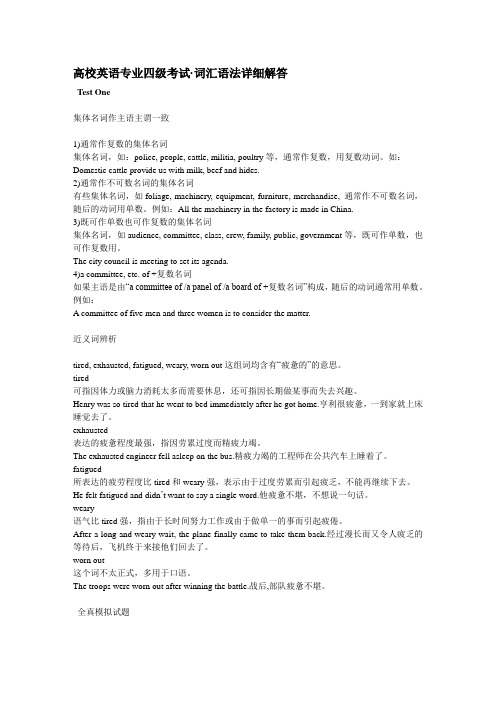
高校英语专业四级考试·词汇语法详细解答Test One集体名词作主语主谓一致1)通常作复数的集体名词集体名词,如:police, people, cattle, militia, poultry等,通常作复数,用复数动词。
如: Domestic cattle provide us with milk, beef and hides.2)通常作不可数名词的集体名词有些集体名词,如foliage, machinery, equipment, furniture, merchandise, 通常作不可数名词,随后的动词用单数。
例如:All the machinery in the factory is made in China.3)既可作单数也可作复数的集体名词集体名词,如audience, committee, class, crew, family, public, government等,既可作单数,也可作复数用。
The city council is meeting to set its agenda.4)a committee, etc. of +复数名词如果主语是由“a committee of /a panel of /a board of +复数名词”构成,随后的动词通常用单数。
例如:A committee of five men and three women is to consider the matter.近义词辨析tired, exhausted, fatigued, weary, worn out这组词均含有“疲惫的”的意思。
tired可指因体力或脑力消耗太多而需要休息,还可指因长期做某事而失去兴趣。
Henry was so tired that he went to bed immediately after he got home.亨利很疲惫,一到家就上床睡觉去了。

专业英语四级重要知识点专业英语四级重要知识点英语专业四级考试(TEM-4,Test for English Majors-Band 4),全称为全国高校英语专业四级考试。
自1991年起由中国大陆教育部实行,考察全国综合性大学英语专业学生。
下面是yjbys店铺为大家带来的专业英语四级重要知识点,欢迎阅读。
一、语法部分考查重点1、虚拟语气的考点为:would rather+that从句+一般过去时;It is vital/ necessary/ important/ urgent/ imperative/ desirable/ advisable/ natural/ essential+that+(should)动词原形;proposal/suggestion+that+动词原形;It is time/about time/high time+that+一般过去时;lest+that+should+动词原形;if only+that+would+动词原形。
2、状语从句的考点为:非if引导的条件状语从句,此类句子多用at times,provided,so long as,in case,once等来替代if;由even if/so,now that,for all等引导的让步状语从句;just/hardly...when引导的时间状语从句;more than,as...as,not so much as,the same as,as much as等引导的比较状语从句。
3、独立主格结构多以逻辑主语+分词的形式出现。
4、情态动词多与完成时形式连用。
5、定语从句重点考查介词+关系代词(which)和as作为关系代词。
二、词汇部分考查重点1、动词、名词与介词的搭配如:popular/patient+with;yield/solution/adapt/transfer/access+to;a ccuse/require+of;charge+for;under+discussion等等。

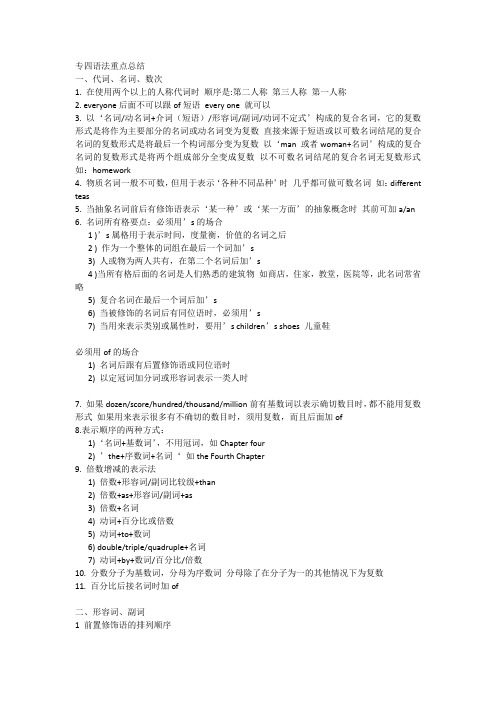
专四语法重点总结一、代词、名词、数次1. 在使用两个以上的人称代词时顺序是:第二人称第三人称第一人称2. everyone后面不可以跟of短语every one 就可以3. 以‘名词/动名词+介词(短语)/形容词/副词/动词不定式’构成的复合名词,它的复数形式是将作为主要部分的名词或动名词变为复数直接来源于短语或以可数名词结尾的复合名词的复数形式是将最后一个构词部分变为复数以‘man 或者woman+名词’构成的复合名词的复数形式是将两个组成部分全变成复数以不可数名词结尾的复合名词无复数形式如:homework4. 物质名词一般不可数,但用于表示‘各种不同品种’时几乎都可做可数名词如:different teas5. 当抽象名词前后有修饰语表示‘某一种’或‘某一方面’的抽象概念时其前可加a/an6. 名词所有格要点:必须用’s的场合1 )’s属格用于表示时间,度量衡,价值的名词之后2 ) 作为一个整体的词组在最后一个词加’s3) 人或物为两人共有,在第二个名词后加’s4 )当所有格后面的名词是人们熟悉的建筑物如商店,住家,教堂,医院等,此名词常省略5) 复合名词在最后一个词后加’s6) 当被修饰的名词后有同位语时,必须用’s7) 当用来表示类别或属性时,要用’s children’s shoes 儿童鞋必须用of的场合1) 名词后跟有后置修饰语或同位语时2) 以定冠词加分词或形容词表示一类人时7. 如果dozen/score/hundred/thousand/million前有基数词以表示确切数目时,都不能用复数形式如果用来表示很多有不确切的数目时,须用复数,而且后面加of8.表示顺序的两种方式:1)‘名词+基数词’,不用冠词,如Chapter four2) ’the+序数词+名词‘如the Fourth Chapter9. 倍数增减的表示法1) 倍数+形容词/副词比较级+than2) 倍数+as+形容词/副词+as3) 倍数+名词4) 动词+百分比或倍数5) 动词+to+数词6) double/triple/quadruple+名词7) 动词+by+数词/百分比/倍数10. 分数分子为基数词,分母为序数词分母除了在分子为一的其他情况下为复数11. 百分比后接名词时加of二、形容词、副词1 前置修饰语的排列顺序可以置于冠词前的形容词(all both such) -----冠词,指示形容词,所有格形容词,不定形容词(a an the this your his any some)-----------基数词(one ) 序数词(first)------------ 表示性质,状态,质量的形容词(good useful)--------------表示大小,长短,形状的形容词----------------表示年龄,新旧,温度的形容词------------表示颜色的形容词---------------------表示国籍,产地,区域的形容词-----------表示材料,用做形容词的名词----------动名词,分词2.后置修饰语由前缀a-构成的形容词3.形容词修饰由some-,any-,every-,no-,-body,-one,-thing等组成的复合不定代词时,必须后置4.enough作形容词修饰名词时既可放前又可放后,但当它作副词修饰形容词或副词时,必须后置5.有些形容词本身就有‘比……年长’,‘比……优等的意思这些形容词后面用介词to 而不用than6.much too 作为副词短语修饰形容词或副词,不修饰名词7.more 不能用来修饰比较级8.与名词连用的more of a .. ./ as much of a... / more of a.... 意为更像……9.as much of a……意为称得上,less of a 意为算不上10.none other than(不是别人,正是)=no other than11.any/sone/every与other连用时,其后若用可数名词,一般为单数三、情态动词、虚拟语气1.can 用于否定句cannot(help)but表示不能不,只能(but后跟不带to的动词不定式)2.must 表示禁止,一定不要时的否定式为mustn’t 当它表示有把握的推断时意为一定准是时它的否定形式为can’t3.need doing=need to be done 这个句型表示被动意味4.need not have done sth 表示本来没有必要做某事(经常考)虚拟语气1.It is (high/about/the)time... 谓语动词用过去式指现在或将来的情况表示早该做某事而现在已经有点晚了2.It is the first(second/third)time后的that从句中,谓语动词要用完成体来表示一种经验3.as if/though 的虚拟要点1) 对当时事实的假设,从句谓语用过去式,be动词一律用were2)对过去事实的假设,从句谓语用过去完成式3)对未来事实的假设,从句谓语用would+动词原型五、比较级比较等级的含义:英语中形容词与副词有三个比较等级,即原级,比较级和最高级。

专四高频词汇1.alter v. 变化,改动,变更2.burst vi.,n. 突然发生,爆裂3.dispose vi. 除掉;处置;解决;解决(of)4.blast n. 爆炸;气流vi. 炸,炸掉5.consume v. 消耗,耗尽6.split v. 劈开;割裂;分裂 a.裂开7.spit v. 吐(唾液等);唾弃8.spill v. 溢出,溅出,倒出9.slip v. 滑动,滑落;忽视10.slide v. 滑动,滑落n. 滑动;滑面;幻灯片11.bacteria n. 细菌12.breed n. 种,品种v. 繁殖,产仔13.budget n. 预算v. 编预算,作安排14.candidate n. 候选人15.campus n. 校园16.liberal a. 慷慨;丰富;自由17.transform v. 转变,变革;变换18.transmit v. 传播,播送;传递19.transplant v. 移植20.transport vt. 运送,运送n.运送,运送工具21.shift v. 转移;转动;转变22.vary v. 变化,变化;使多样化23.vanish vi. 消灭,不见24.swallow v. 吞下,咽下n. 燕子25.suspicion n. 怀疑,疑心26.suspicious a. 怀疑,可疑d a. 温暖,暖和;温柔,味淡28.tender a. 温柔;脆弱29.nuisance n. 损害,妨害,讨厌(人或事物)30.insignificant a. 无意义,无足轻重;无价值31.accelerate vt. 加速,增进32.absolute a. 绝对,无条件;完全33.boundary n. 分界线,边界34.brake n. 刹车,制动器v. 刹住(车)35.catalog n. 目录(册)v. 编目36.vague a. 模糊,不明确37.vain n. 徒劳,白费38.extinct a. 绝灭,熄灭39.extraordinary a. 不寻常,特别,非凡40.extreme a. 极度,极端n. 极端,过度41.agent n. 代理人,代理商;动因,因素42.alcohol n. 含酒精饮料,酒精43.appeal n./vi. 呼吁,哀求44.appreciate vt. 注重,赏识,欣赏45.approve v. 赞成,批准,批准46.stimulate vt. 刺激,勉励47.acquire vt. 获得,获得;学到48.accomplish vt .完毕,到达;实行work n. 网状物;广播网,电视网;网络50.tide n. 潮汐;潮流51.tidy a. 整洁,整洁52.trace vt. 追踪,找到n. 痕迹,踪迹53.torture n./vt. 拷打,折磨54.wander vi. 漫游,闲逛55.wax n. 蜡56.weave v. 织,编57.preserve v. 保护,保存,保持,维持61. abuse v. 滥用,虐待;谩骂62. academic a. 学术;高等院校;研究院64. battery n. 电池(组)65. barrier n. 障碍;棚栏66. cargo n. (船、飞机等装载)货品67. career n. 生涯,职业68. vessel n. 船舶;容器,器皿;血管69. vertical a. 垂直70. oblige v. 迫使,责成;使感激71. obscure a. 阴暗,模糊72. extent n. 限度,范畴,大小,限度73. exterior n. 外部,外表a. 外部,外表74. external a. 外部,外表,外面75. petrol n. 汽油76. petroleum n. 石油77. delay vt./n. 推迟,延误,耽误78. decay vi. 腐烂,腐朽79. decent a. 像样,体面80. route n. 路;路线;航线81. ruin v. 毁坏,破坏n. 毁灭,[pl.]废墟82. sake n. 缘故,理由83. satellite n. 卫星84. scale n. 大小,规模;级别;刻85. temple n. 庙宇86. tedious a. 乏味道,单调,87. tend vi.易于,趋向88. tendency n.趋向,趋势89. ultimate a. 极端,最大,最后n. 极端90. undergo v. 经历,遭受91. abundant a. 丰富,充裕,大量92. adopt v. 收养;采用;采纳93. adapt vi. 适应,适合;改编,改写vt. 使适应94. bachelor n. 学士,学士学位;单身汉95. casual a. 偶尔,碰巧;暂时;非正式96. trap n. 陷阱,圈套v. 设陷阱捕获97. vacant a. 空,未占用98. vacuum n. 真空,真空吸尘器99. oral a. 口头,口述,口100. optics n. (单、复数同形)光学词组汇总(一)___基本篇。

英语专业四级语法重点汇总English英语专八专四学习复习资料英语专四语法重点汇总一、非谓语动词的主要考点1. 有些典型动词后面可以接上不定式或动名词来做宾语的,但是在意思上是有区别的,主要常考到的动词罗列如下:mean to do想要(做某事)VS mean doing意味(做某事)propose to do 打算(做某事)VS propose doing建议(做某事)forget to do忘记(要做的事)VS forget doing忘记(已做的事)remember to do记得(要做某事)VS remember doing记得(做过)go on to do继而(做另一件事)VS go on doing继续(做原来的事)stop to do停下来去做另一件事VS stop doing停止正在做的事regret to do(对将要做的事)遗憾VS regret doing(对已做过的事)后悔2. 不定式的习惯用法典型句型整理如下:如:“cannot help but do”——“不得不做某事”如:“cannot but do”——“不禁做某事”如:“cannot choose but do”——“不由自主地做某事”如:“can do nothing but do”——“不能不做某事”如:“have no choice but to do”——“只能做某事”如:“have no alternative but to do”——“只能做某事”例句:The boy cannot help but be greatly influenced by the useful instruction given by his family tutor.When I start my job career, I cannot choose but look back upon the beautiful days I spent on campus.3. 动名词的习惯用法典型动名词的习惯句型整理罗列如下:如:be busy/active doing sth.如:It’s no good/use doing sth.如:spend/waste time doing sth.如:have difficulty/trouble/problem doing sth.如:have a good/great/wonderful time doing sth.如:There is no point/sense/harm/ use doing sth.例句:There is no use crying over spilt milk.(典型例句)牛奶洒了,哭也没用;后悔是没有用的;覆水难受I really have problem solving these mathematic questions since I am not major in science after all.二、形容词与副词及其比较级1. 形容词的句法功能形容词通常在句子中用做定语、表语与主语的语法成分,通常考到的知识点总结如下:(1) 以“a”开头的形容词如“alone”、“alike”、“asleep”、“awake”等一般不能做前置定语,通常是做表语或后置定语的例句:Jerry didn’t pass the important final exam, please let him alone for the time being.Michael came back from job just now, and his eyes were shut and he seemed to have fallen asleep.(2) 某些以副词词缀“-ly”结尾的词其实是形容词,不能看错是副词,例如“friendly”、“leisurely”、“lovely”等(3) 下列动词既是实义动词又是系动词,注意用做系动词时,要求形容词做表语这些典型单词罗列如下:“remain”、“keep”、“become”、“get”、“grow”、“go”、“come”、“turn”、“stay”、“stand”、“run”、“prove”、“seem”、“appear”、“look”等例句:The situation remains tense between the two countries at this juncture. 在这个节骨眼上,两国形势仍然持续紧张。

英语四级考试语法结构与词汇一、语法结构部分。
1. 时态。
- 一般现在时。
- 用法:表示经常发生的动作、存在的状态或客观事实。
- 结构:主语 + 动词原形(第三人称单数主语时动词加 -s或 -es)。
例如:I play football every Sunday.(play,动词原形,[pleɪ])He plays football every Sunday.(plays,动词第三人称单数形式,[pleɪz])- 一般过去时。
- 用法:表示过去某个时间发生的动作或存在的状态。
- 结构:主语+动词的过去式。
例如:I saw a movie yesterday.(saw,see的过去式,[sɔː],动词)- 现在进行时。
- 用法:表示现在正在进行的动作。
- 结构:主语+be动词(am/is/are)+动词的 -ing形式。
例如:She is reading a book.(is,be动词第三人称单数形式,[ɪz];reading,动词的 -ing形式,['ri ːdɪŋ])- 过去进行时。
- 用法:表示过去某个时刻正在进行的动作。
- 结构:主语+be动词(was/were)+动词的 -ing形式。
例如:He was watching TV at 8 o'clock last night.(was,be动词第一、三人称单数过去式,[wɒz];watching,动词的 -ing形式,['wɒtʃɪŋ])2. 从句。
- 定语从句。
- 概念:在句中作定语,修饰名词或代词。
- 关系代词:who(指人,主格,[huː]),whom(指人,宾格,[huːm]),which(指物,[wɪtʃ]),that(指人或物,[ðæt])。
例如:The boy who/that is standing there is my brother.(这里who/that引导定语从句修饰the boy)- 名词性从句。
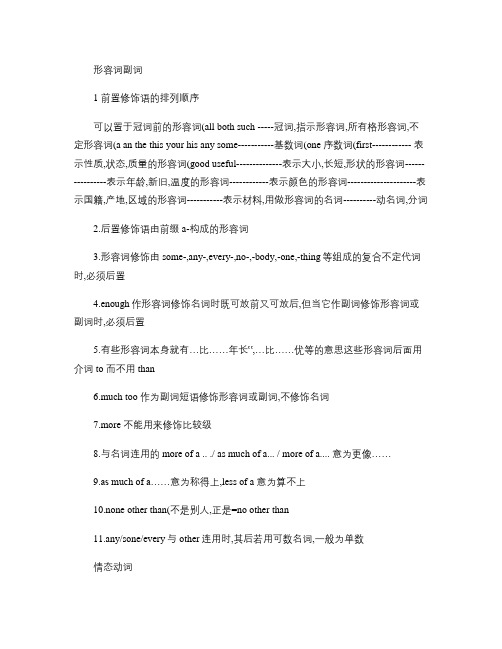
形容词副词1 前置修饰语的排列顺序可以置于冠词前的形容词(all both such -----冠词,指示形容词,所有格形容词,不定形容词(a an the this your his any some-----------基数词(one 序数词(first------------ 表示性质,状态,质量的形容词(good useful--------------表示大小,长短,形状的形容词----------------表示年龄,新旧,温度的形容词------------表示颜色的形容词---------------------表示国籍,产地,区域的形容词-----------表示材料,用做形容词的名词----------动名词,分词2.后置修饰语由前缀a-构成的形容词3.形容词修饰由some-,any-,every-,no-,-body,-one,-thing等组成的复合不定代词时,必须后置4.enough作形容词修饰名词时既可放前又可放后,但当它作副词修饰形容词或副词时,必须后置5.有些形容词本身就有…比……年长‟,…比……优等的意思这些形容词后面用介词to 而不用than6.much too 作为副词短语修饰形容词或副词,不修饰名词7.more 不能用来修饰比较级8.与名词连用的more of a .. ./ as much of a... / more of a.... 意为更像……9.as much of a……意为称得上,less of a 意为算不上10.none other than(不是别人,正是=no other than11.any/sone/every与other连用时,其后若用可数名词,一般为单数情态动词1.can 用于否定句cannot(helpbut表示不能不,只能(but后跟不带to的动词不定式2.must 表示禁止,一定不要时的否定式为mustn‟t当它表示有把握的推断时意为一定准是时它的否定形式为can‟t3.need doing=need to be done 这个句型表示被动意味4.need not have done sth 表示本来没有必要做某事(经常考虚拟语气1.It is (high/about/thetime... 谓语动词用过去式指现在或将来的情况表示早该做某事而现在已经有点晚了2.It is the first(second/thirdtime后的that从句中,谓语动词要用完成体来表示一种经验3.as if/though 的虚拟要点1 对当时事实的假设,从句谓语用过去式,be动词一律用were2对过去事实的假设,从句谓语用过去完成式3对未来事实的假设,从句谓语用would+动词原型专四语法重点总结比较级比较等级的含义英语中形容词与副词有三个比较等级,即原级,比较级和最高级。

一、考纲要求及语法知识常考点(一)动词的基本时态、语态的构成及其用法2. 动词的语态1) 不能用于被动语态的动词和短语(1)在英语中,不及物动词不能用于被动语态,但有些不及物动词(包括短语)容易引起误用。
如:appear, belong to, die, escape, fall, happen, last, succeed, occur, take place, consist of。
Our success belongs to all the people present. 我们的成功属于在座的每一个人。
(2)某些表示状态或特征的及物动词,如:become, contain, cost, fit, have, resemble, suit也没有被动语态。
2) 少数动词的主动语态有时有被动的意思(专业四级英语重要考点)例1:The book is selling remarkably well.这本书卖得很好例2:The song sounds very beautiful. 这首歌听起来很优美。
能这样用的动词还有read(读起来),clean(擦起来),wash(洗起来),write(写起来)。
例3:My watch needs cleaning. (= My watch needs to be cleaned).能像need这样用的动词还有:want, require, deserve等。
例4:The meat is cooking.例5:The shop doesn’t open(营业)on Sunday. 试比较:The door was opened by Tom.3) 注意几个基本句型.(专业四级英语重要考点)It is said …(据说).,It is reported …(据报道), It is widely believed(人们广泛认为); It is expected …(据期望,应该)It is estimated…. ( 据估计), It was said…, It was believed … It was thought …( 以前人们认为...)。
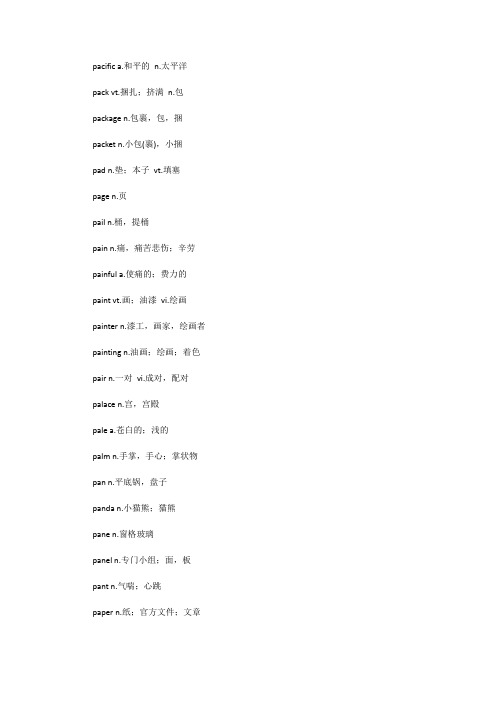
pacific a.和平的n.太平洋pack vt.捆扎;挤满n.包package n.包裹,包,捆packet n.小包(裹),小捆pad n.垫;本子vt.填塞page n.页pail n.桶,提桶pain n.痛,痛苦悲伤;辛劳painful a.使痛的;费力的paint vt.画;油漆vi.绘画painter n.漆工,画家,绘画者painting n.油画;绘画;着色pair n.一对vi.成对,配对palace n.宫,宫殿pale a.苍白的;浅的palm n.手掌,手心;掌状物pan n.平底锅,盘子panda n.小猫熊;猫熊pane n.窗格玻璃panel n.专门小组;面,板pant n.气喘;心跳paper n.纸;官方文件;文章parade n.游行;检阅vi.游行paradise n.伊甸乐园;天堂paragraph n.(文章的)段,节parallel a.平行的;相同的parcel n.包裹,小包,邮包pardon n.原谅;赦免vt.原谅parent n.父亲,母亲,双亲park n.公园;停车场parliament n.议会,国会part n.一部分;零件;本份partial a.部分的;不公平的partially ad.部分地participate vi.参与,参加;分享particle n.粒子,微粒particular a.特殊的;特定的particularly ad.特别,尤其,格外partly ad.部分地,不完全地partner n.伙伴;搭挡;配偶party n.党,党派;聚会pass vt.经过;通过;度过passage n.通过;通路,通道passenger n.乘客,旅客,过路人passion n.激情,热情;爱好passive a.被动的;消极的passport n.护照past a.过去的n.过去paste n.糊,酱;浆湖pastime n.消遣,娱乐pat n.&vt.&n.轻拍patch n.补钉;碎片vt.补缀path n.路,小道;道路patience n.忍耐,容忍,耐心patient a.忍耐的n.病人pattern n.型,式样,模,模型pause n.&vi.中止,暂停pave vt.铺,筑(路等)pavement n.(英)人行道paw n.脚爪,爪子pay vt.支付;付给;给予payment n.支付,支付的款项pea n.豌豆;豌豆属植物peace n.和平;和睦;平静peaceful a.和平的;安静的peach n.桃子,桃树peak n.山顶,巅 a.最高的pear n.梨子,梨树pearl n.珍珠;珍珠母peasant n.农夫pebble n.卵石,细砾peculiar a.特有的;特别的peel vt.剥(皮),削(皮)peep vi.(从缝隙中)偷看pen n.钢笔,自来水笔pencil n.铅笔penetrate vt.穿过vi.穿渗入渗出peninsula n.半岛penny n.(英)便士;(美)分pension n.抚恤金,年金people n.人民,民族;人pepper n.胡椒,胡椒粉per prep.每perceive vt.察觉,发觉;理解percent n.百分之…percentage n.百分比,百分率perfect a.完美的;完全的perfectly ad.很,完全perform vt.履行,执行;演出performance n.履行;演出;行为perfume n.香味,芳香;香料perhaps ad.也许,可能,多半period n.时期;学时;句号permanent a.永久的,持久的permanently ad.永久地,持久地permission n.允许,许可,同意permit vt.允许n.执照persist vi.坚持,固执;持续person n.人;人身;本人personal a.个人的;本人的personnel n.全体人员,全体职员perspective n.透视;遥景;观点persuade vt.说服vi.被说服pessimistic a.悲看的;厌世的pet n.爱畜;宠儿a.宠爱的petrol n.(英)汽油petroleum n.石油phase n.阶段;方面;相位phenomenon n.现象philosopher n.哲学家philosophy n.哲学;哲理;人生看phone n.电话,电话机;耳机photograph n.照片,相片photographic a.摄影的,摄影用的phrase n.短语;习惯用语physical a.物质的;物理的physician n.医生,内科医生physicist n.物理学家physics n.物理学piano n.钢琴pick n.镐,鹤嘴锄pick vt.拾,摘vi.采摘picnic n.郊游,野餐vi.野餐picture n.画,图片vt.画pie n.(西点)馅饼piece n.碎片,块vt.拼合pierce vt.剌穿vi.穿渗入渗出pig n.猪,小猪,野猪pigeon n.鸽子pile n.堆vt.堆叠,累积pill n.药丸,丸剂pillar n.柱,柱子;栋梁pillow n.枕头pilot n.领航员;飞行员pin n.针,饰针n.别住pinch vt.捏,拧,掐掉pine n.松树,松木pink n.粉红色a.粉红色的pint n.品脱pioneer n.拓荒者;先驱者pipe n.管子,导管;烟斗pipeline n.管道,管线pistol n.手枪pit n.坑,地坑;煤矿pitch n.沥青pitch vt.投,掷vi.投掷pity n.怜悯;遗憾vt.同情place n.地方,地点;住所plain n.平原 a.清楚的plan n.&vt.计划,打算plane n.平面;飞机planet n.行星plant n.植物;工厂vt.栽种plantation n.种植园;栽植plaster n.灰泥;硬膏;熟石膏plastic a.可塑的n.塑料plate n.板,片,盘vt.电镀platform n.平台;站台;讲台play vi.玩,游戏;演奏player n.游戏的人;比赛者playground n.操场,运动场pleasant a.令人愉快的,舒适的please vt.使高兴,请vi.满足pleasure n.舒畅,快乐;乐事plentiful a.丰富的,富裕的plenty n.丰富,充足,大量plot n.小块土地vt.密谋plough n.犁vt.&vi.犁,耕pluck vt.采,摘;拉下n.拉plug n.塞子;插头vt.塞plunge vt.使投入;使陷渗透plural a.复数的n.复数plus prep.加,加上 a.正的P.M. n.下午,午后pocket n.衣袋n.袖珍的poem n.诗,韵文,诗体文poet n.诗人poetry n.诗,诗歌,诗作point n.点;要点;细目;分poison n.毒,毒药vt.毒害poisonous a.有毒的,有害的pole n.杆,柱pole n.极(点),磁极,电极police n.警察;警察当局policeman n.警察policy n.政策,方针polish vt.磨光;使优美polite a.有礼貌的;有教养的political a.政治的,政治上的politician n.政治家;政客politics n.政治,政治学;政纲pollute vt.弄脏,污染,沾污pollution n.污染pond n.池塘pool n.水塘,游泳池,水池pool n.共用物vt.共有poor a.贫穷的;贫乏的pop n.流行音乐,流行歌曲pop n.砰的一声,爆破声popular a.民众的;流行的population n.人口;全体居民porch n.门廊,渗入渗出口处pork n.猪肉porridge n.粥,麦片粥port n.港,港口portable a.轻巧的;手提的porter n.搬运工人portion n.一部分;一分portrait n.消像,画像Portuguese n.葡萄牙人;葡萄牙语position n.位置;职位;姿势positive a.确定的;积极的possess vt.占用,拥有(财产) possession n.有,所有;占有物possibility n.可能;可能的事possible a.可能的;可能存在的possibly ad.可能地;也许post n.柱,桩,杆vt.贴出post n.邮政,邮寄;邮件post n.岗位,哨所;职位postage n.邮费,邮资postman n.邮递员postpone vt.延迟,推迟,延缓pot n.锅,壶,罐,盆potato n.马铃薯,土豆potential a.潜在的n.潜力pound n.磅;英磅pound vt.捣碎;舂烂;猛击pour vt.灌,倒vi.倾泻poverty n.贫穷,贫困powder n.粉末;药粉;火药power n.能力;力;权;幂powerful a.强有力的;有权威的practical a.实践的;实用的practically ad.实际上;几乎practice n.实践;练习;业务practise vt.练习,实习,训练praise n.赞扬,赞美vi.赞扬pray vt.&vi.请求;祈祷prayer n.祈祷,祈求precaution n.预防;警惕preceding a.在前的;在先的precious a.珍贵的,宝贵的precise a.精确的,准确的precision n.精确,精密,精密度predict v.预言,预报,预测preface n.序言,前言,引语prefer vt.宁可,宁愿preferable a.更可取的,更好的preference n.偏爱,优先;优先权prejudice n.偏见,成见preliminary a.预备的,初步的premier n.总理,首相preparation n.准备,预备;制备prepare vt.&vi.准备,预备preposition n.前置词,介词prescribe vt.命令;处(方) presence n.出席,到场;在present a.现在的n.目前present vt.赠送; 介绍; 提出present n.礼物,赠送物presently ad.一会儿;目前preserve vt.保护;保存;腌渍president n.总统;校长;会长press vt.压,按,揿;催促pressure n.压力;压力;压,按pretend vt.假托,借口vi.假装pretty a.漂亮的,标致的prevail vi.胜,优胜;流行prevent vt.预防,防止;阻止previous a.先的;前的ad.在前previously ad.先前,预先price n.价格,价钱;代价pride n.骄傲;自豪vt.自夸priest n.教士,牧师,神父primarily ad.首先;主要地primary a.最初的;基本的prime a.首要的n.春,青春primitive a.原始的;粗糙的prince n.王子,亲王princess n.公主,王妃principal a.主要的n.负责人principle n.原则,原理;主义print vt.印刷n.印刷;正片prior a.在先的;优先的prison n.监狱,监禁prisoner n.囚犯private a.私人的;私下的privilege n.特权,优惠prize n.奖赏,奖金vt.珍视probability n.可能性;概率probable a.或有的;大概的probably ad.或许,大概problem n.问题;习题,问题procedure n.程序;手续;过程proceed vi.入行;继续入行process n.过程;工序vt.加工procession n.队伍,行列proclaim vt.宣告,宣布;表明produce vt.生产;产生;展现product n.产品,产物;(乘)积production n.生产;产品;总产量productive a.生产的;丰饶的profession n.职业professional a.职业的n.专业人员professor n.教授profit n.益处;利润vi.得益program n.节目单;大纲;程序progress n.前入,进展;入步progressive a.入步的;向前入的prohibit vt.禁止,阻止project n.方案,工程vi.伸出prominent a.实起的;突出的promise n.诺言;指望vt.允诺promising a.有希望的;有前途的promote vt.促入,发扬;提升prompt a.及时的vt.敦促pronoun n.代名词pronounce vt.发…的音;宣布pronunciation n.发音,发音法proof n.证据;证实;校样proper a.适合的;合乎体统的properly ad.适当地;彻底地property n.财产,资产;性质proportion n.比,比率,部分proportional a.比例的;相称的proposal n.提议,建议;求婚propose vt.提议vi.求婚prospect n.展望;前景,前程prosperity n.繁荣;昌盛,兴旺prosperous a.繁荣的,昌盛的protect vt.保护,保卫,警戒protection n.保护,警戒protective a.保护的,防护的protein n.蛋白质,朊protest vt.&vi.&n.抗议proud a.骄傲的;自豪的prove vt.证实vi.结果是provide vt.提供;装备,供给provided conj.以…为条件province n.省;领域,部门provision n.供应;预备;存粮psychological a.心理的,心理学的public a.公众的n.公众publication n.公布;出版;出版物publish vt.公布;发表;出版pudding n.布丁puff n.(一)喷,(一)吹pull vt.拉,拖;拉,拉力pulse n.脉搏;脉冲,脉动pump n.泵vt.用抽机抽punch vt.冲出n.冲压机punch vt.用拳猛击n.拳打punctual a.严守时刻的;准时的punish vt.罚,惩罚,处罚punishment n.罚,惩罚,处罚pupil n.学生,小学生pupil n.瞳孔puppet n.木偶,玩偶;傀儡purchase n.买,购买vt.买pure a.纯粹的;纯洁的purely ad.纯粹地,完全地purify vt.使纯净,使洁净purity n.纯净;纯洁;纯度purple n.紫色 a.紫的purpose n.目的;意图;效果purse n.钱包,小钱袋,手袋pursue vt.追赶,追踪;入行pursuit n.追赶;追求;事务push vt.推,逼迫vi.推put vt.放,摆;使处于puzzle n.难题;谜vi.使迷惑Q qualify vt.使具有资格quality n.质量;品质,特性quantity n.量,数量,分量quarrel n.争吵,吵架,口角quart n.夸脱(=2品脱)quarter n.四分之一;一刻钟quarterly a.季度的ad.季度地queen n.王后;女王queer a.奇怪的,古怪的question n.发问;问题;疑问queue n.行列vi.排队等候quick a.快的;敏捷的quicken vt.加快vi.加快quickly ad.快,迅速quiet a.寂静的;安静的quilt n.被(子)quit vt.离开,退出;停止quite ad.完全;相当;的确quiz n.小型考试,测验quotation n.引用;引文;报价单quote vt.引用,引证;报价R rabbit n.兔子,野兔race n.比赛,竞赛,竞争race n.人种,种族,民族racial a.种族的,人种的rack n.搁物架;行李架rack vt.使苦痛,折磨racket n.球拍radar n.雷达,无线电探测器radiate vi.发射光线;辐射radiation n.放射,发射;辐射能radio n.无线电;收音机radioactive a.放射性的radioactivity n.放射性,放射(现象) radish n.小萝卜radium n.镭radius n.半径rag n.破布,碎布,抹布rage n.(一阵)狂怒,盛怒raid n.袭击;突然搜查rail n.横条,横杆;铁轨railroad n.铁路vi.由铁路运输railway n.铁路,铁道rain n.雨,雨水vi.下雨rainbow n.虹,彩虹rainy a.下雨的,多雨的raise vt.举起;引起;提高rake n.耙子vi.耙;搜索range n.排,行;山脉;范围rank n.排,横行;社会阶层rapid a.快的n.急流rapidly ad.迅速地rare a.稀薄的;稀有的rarely ad.很少,难得rat n.老鼠,耗子rate n.比率;速度;价格rather ad.宁可,宁愿;相当ratio n.比,比率rational a.理性的;出于理性的raw a.未煮过的;未加工的ray n.光线,射线,辐射线razor n.剃刀reach vt.抵达;伸出vi.达到react vi.起反应;有影响reaction n.反应;反作用read vt.读,观懂vi.读reader n.读者;读物,读本readily ad.乐意地;无困难地reading n.读,阅读;读书ready a.准备好的;愿意的real a.真的;现实的reality n.现实;真实realize vt.实现;熟悉到really ad.真正地;实在realm n.王国,国土;领域reap vt.&vi.收割,收获rear n.后部,后面;背面rear vt.抚养,培养;栽种reason n.理由;理性vi.推理reasonable a.合情合理的;公道的rebel vi.造反n.造反者rebellion n.造反;叛乱;反抗recall vt.往返想;叫来回;收来回receipt n.收到;收条,收据receive vt.收到;得到;接待receiver n.收受者,收件人recent a.新近的,最近的recently ad.最近,新近reception a.接待;招待会;接受recite vt.&vi.背诵,朗诵recognition n.认出,识别;承认recognize vt.认识,认出;承认recollect vt.往返忆,追忆,想起recommend vt.推荐,介绍;劝告recommendation n.推荐,介绍;劝告record n.记录;履历vt.记录recorder n.记录者;录音机recover vt.重新获得;挽来回recovery n.重获;痊愈,恢复red a.红色的n.红色reduce vt.减少,减小;简化reduction n.减少,减小,缩减reed n.芦苇,芦杆,芦丛reel n.卷轴,卷筒refer vt.使求助于vi.谈到reference n.参考;出处;提及refine vt.&vi.精炼,提纯reflect vt.反射;反映;思考reflection n.反射;映象;反映reflexion n.反射;映象;反映reform vt.&n.改革,改良refresh vt.使清新vi.恢复精神refreshment n.茶点,点心,便餐refrigerator n.冰箱,冷藏库refuge n.避难,庇护;庇护者refusal n.拒绝refuse vt.拒绝vt.拒绝refute vt.驳斥,反驳,驳倒regard vt.把…观作;尊敬regarding prep.关于regardless ad.不顾一切地region n.地区,地带;领域register n.&vt.登记,注册regret vt.懊悔;抱歉n.懊悔regular a.规则的;整洁的regularly ad.有规律地regulate vt.管理,控制;调整regulation n.规则,规章;管理rehearsal n.排练,排演;练习reign n.君主统治;支配rein n.缰绳vi.驾驭,控制reinforce vt.增援,支援;加强reject vt.拒绝;丢掉;驳回rejoice vi.欣喜,高兴relate vt.叙述;使联系relation n.关系,联系;家属relationship n.关系,联系relative a.有关系的;相对的relatively ad.相对地,比较地relativity n.相关性;相对性relax vt.使松弛vi.松弛release vt.释放;放松;发表relevant a.有关的,贴切的reliability n.可靠性reliable a.可靠的,可信赖的reliance n.信任,信赖,信心relief n.减轻;救济;援救relieve vt.减轻,解除;救济religion n.宗教;宗教信仰religious a.宗教的;虔诚的reluctant a.不愿的,勉强的rely vi.依赖,依靠;信赖remain vi.剩下,余留;保持remains n.残余,余额;废墟remark vt.&vi.&n.评论,谈论remarkable a.异常的,非凡的remedy n.&vt.治疗;补救remember vt.记得,想起;记住remind vt.提醒,使想起remote a.相隔很远的;心灰意冷淡的removal n.移动;迁移;除掉remove vt.移动,搬开;脱掉render vt.表示,给予;使得renew vt.使更新vi.更新rent n.租金,租vi.出租repair vt.&n.修理,修补repeat vt.重说,重做n.重复repeatedly ad.重复地;一再repent vi.悔悟,悔改vt.后悔repetition n.重复,反复replace vt.把…放往返;取代reply vi.&n.来回答,答复report vt.&vi.报告;汇报reporter n.记者,通讯员represent vt.描绘;代表;象征representative a.代表性的n.代表reproach vt.&n.责备,指责reproduce vt.&vi.繁殖,生殖republic n.共和国,共和政体republican a.共和国的reputation n.名誉,名声;好名声request n.&v.请求,要求require vt.需要;要求,命令requirement n.需要;要求rescue vt.&n.援救,营救research n.&vi.调查,探究researcher n.调查者;探究者resemble vt.像,类似reserve vt.储备,保留;预定reservior n.水库;蓄水池residence n.居住;驻扎;住处resident a.居住的n.居民resign vt.放弃vi.辞职resignation n.放弃,辞职,反抗resist vt.&vi.抵抗,抵制resistance n.抵抗;抵制;抵抗力resistant a.抵抗的,反抗的resolution n.坚决,坚定;决定resolve vt.解决;决心n.决心resort vi.&n.求助,凭借resource n.资源,物力;办法respect n.&vt.尊敬,尊重respectful a.恭敬的,尊重的respective 各自的,各个的respectively ad.各自地,分别地respond vi.作答;响应response n.作答,回答;响应responsibility n.责任,责任心;职责responsible a.有责任的;尽责的rest n.休息;安静;静止rest n.剩余部分;其余的人restaurant n.餐馆,饭店,菜馆restless a.不安定的,焦虑的restore vt.恢复;回还;修补restrain vt.抑制,遏制;限制restraint n.抑制;遏制;克制restrict vt限制,限定,约束restriction n.限制,限定,约束result n.成果vi.发生,结果resume vt.恢复;重新开始retain vt.保持,保留,保有retell vt.再讲,重述,复述retire vi.退下;引退;就寝retreat vi.(被迫)退却,后退return vi.&n.往返来,返来回reveal vt.展现;揭示,揭露revenge vt.替…报仇n.报仇reverse vt.颠倒,翻转n.背面review vt.再检查n.复习revise vt.修订,校订;修改revolt vi.&n.反抗,造反revolution n.革命;旋转,绕转revolutionary a.革命的n.革命者reward n.报答;报酬vt.报答rhythm n.韵律,格律;节奏rib n.肋,肋骨ribbon n.缎带,丝带;带rice n.稻,米,饭rich a.富的,丰富的rid vt.使摆脱,使去掉riddle n.谜,谜语ride vi.&n.骑马,乘车rider n.骑马的人;乘车的人ridge n.脊;岭,山脉;垄ridiculous a.荒谬的,可笑的rifle n.步枪,来复枪right a.正确的ad.对,正好rigid a.刚硬的;僵硬的ring n.环形物(如圈、环等) ring vi.叫;按铃n.铃声ripe a.熟的;时机成熟的ripen vt.使熟vi.成熟rise vi.起立;升起;上涨risk n.风险,危险,冒险rival n.竞争者a.竞争的river n.江,河,水道road n.路,道路,公路roar vi.吼鸣;呼喊n.吼roast vt.&vi.烤,炙,烘rob vt.&vi.抢劫;劫掠robber n.强盗,盗贼robbery n.抢劫,劫掠,盗取robe n.长袍,长衣,浴衣robot n.机器人;自动机rock vt.摇,使动摇vi.摇rock n.岩,岩石;石头rocket n.火箭,火箭发动机rod n.杆,竿,棒role n.角色,作用,任务roll vi.&vt.滚动;转动roller n.滚柱,滚筒,滚轴Roman n.古罗马人a.罗马的romantic a.浪漫的;传奇的roof n.屋顶,车顶;顶room n.房间;地位;余地root n.根,根子vi.生根rope n.绳,索rose n.蔷薇花,蔷薇科植物rot vt.烂,腐坏n.腐烂rotary a.旋转的,转动的rotate vi.旋转vt.使旋转rotation n.旋转,转动;循环rotten a.腐烂的,发臭的rough a.表面不平的;粗略的roughly ad.粗糙地,粗略地round a.圆的n.兜圈;一轮rouse vt.唤醒,唤起;惊起route n.路,路线,路程routine n.例行公事 a.日常的row n.(一)排,(一)行row vt.划(舟等) vi.划舟royal a.王的;皇家的rub vt.摩擦,擦vi.摩擦rubber n.橡皮(擦子);橡胶rubbish n.垃圾,废物;废话rude a.加工粗糙的;粗野的rug n.小地毯;毛毯ruin n.毁灭;废墟vt.毁坏rule n.统治;规定;习惯ruler n.统治者;尺,直尺rumour n.谣言,谣传,传闻run vi.跑,奔;行驶;流runner n.赛跑的人rural a.农村的,田园的rush vi.冲,奔vt.催促Russian a.俄罗斯的n.俄国人rust n.锈vi.生锈,氧化rusty a.生锈的;变迟钝的。

专四语法考点串讲语法回顾篇:专四语法考点虚拟语气、情态动词、非谓语动词、复合句、倒装、小语法(省略,时态,反义疑问句,代词,强调句,主谓一致,冠词,形容词及副词)、as 的特殊用法。
专四英语语法考点串讲之一虚拟语气一般说来,有下列几种考点需要考生注意(十考点及两备考点)考点1. 与现在事实相反从句谓语动词用did(be用were),主句谓语动词would(should,could,might)+do;考点2. 与过去事实相反从句谓语动词用had done,主句谓语动词用would(should,could,might)+ have done;例如:43.I _________the party much more if there hadn’t been quite such a crowd of people there.A. would enjoyB. will have enjoyedC. would have enjoyedD. will be enjoying49.All of us would have enjoyed the party much more if there _________ quite such a crowd of people there.A. weren’tB. hasn’t beenC. hadn’t beenD. wouldn’t考点3.与将来事实相反,从句谓语动词用:did(should+do或were + to do),主句谓语动词用:would(should,could,might)+do。
例如:43. If your car ___ any attention during the first 12 months, take it to an authorized dealer.(08年)• A. shall need C. would need• B. should need D. will need考点4. 时态的交叉现象,也就是主句与从句的动作发生在不同的时间段例如:If you had gone to see the doctor,you would be all right now.你要是早去看病,你现在就没事了。
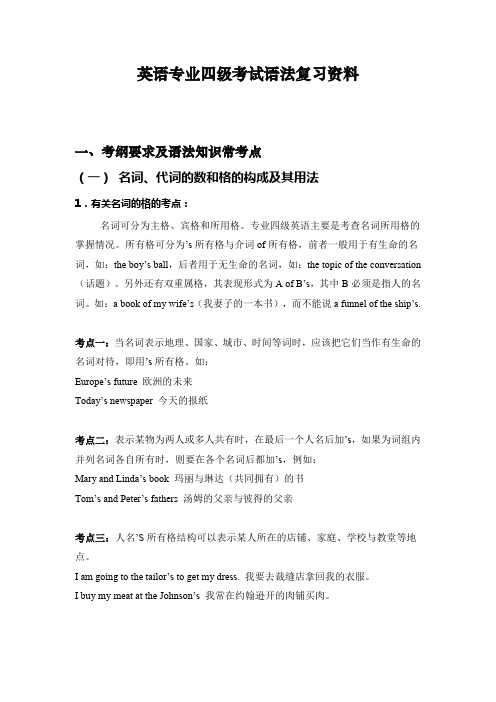
英语专业四级考试语法复习资料一、考纲要求及语法知识常考点(一)名词、代词的数和格的构成及其用法1.有关名词的格的考点:名词可分为主格、宾格和所用格。
专业四级英语主要是考查名词所用格的掌握情况。
所有格可分为’s所有格与介词of所有格,前者一般用于有生命的名词,如:the boy’s ball,后者用于无生命的名词,如:the topic of the conversation (话题)。
另外还有双重属格,其表现形式为A of B’s,其中B必须是指人的名词。
如:a book of my wife’s(我妻子的一本书),而不能说a funnel of the ship’s.考点一:当名词表示地理、国家、城市、时间等词时,应该把它们当作有生命的名词对待,即用’s所有格。
如:Europe’s future 欧洲的未来Today’s newspaper 今天的报纸考点二:表示某物为两人或多人共有时,在最后一个人名后加’s,如果为词组内并列名词各自所有时,则要在各个名词后都加’s,例如:Mary and Linda’s book 玛丽与琳达(共同拥有)的书Tom’s and Peter’s fathers 汤姆的父亲与彼得的父亲考点三:人名’S所有格结构可以表示某人所在的店铺、家庭、学校与教堂等地点。
I am going to the tailor’s to get my dress. 我要去裁缝店拿回我的衣服。
I buy my meat at the Johnson’s 我常在约翰逊开的肉铺买肉。
They took part in the birthday party at Tom’s. 他们参加了在汤姆家举行的生日宴会。
2. 有关名词数的考点:考点一:复合名词的复数:一般而言,我们把核心词变为复数形式即可,如:passers-by, mothers-in-law; assistant directors;girl friends,但当修饰词是man,woman时,复合词各组成部分都要变为复数,例如:menservants,womenservants考点二:复数形式的名词用于单数概念,其谓语动词用单数。

专四词汇全面总结大全对于英语专业的学生来说,通过专业四级考试(TEM4)是一项重要的任务。
而词汇量的积累在备考过程中起着至关重要的作用。
下面为大家带来一份专四词汇的全面总结。
首先,我们来谈谈名词。
名词是英语词汇中最基本的一类。
像“abundance”(丰富;充裕)、“access”(通道;机会)、“accommodation”(住处;膳宿)等,都是常见且重要的名词。
在记忆名词时,不仅要记住其词义,还要注意其单复数形式以及与其他词的搭配。
动词也是不可忽视的一部分。
“acquire”(获得;取得)、“adapt”(适应;改编)、“adjust”(调整;校准)等动词在句子中往往起着关键的作用。
对于动词,需要了解其不同的时态、语态以及固定搭配。
形容词能够使描述更加生动和准确。
“adequate”(足够的;适当的)、“admirable”(令人钦佩的;值得赞扬的)、“advantageous”(有利的;有益的)等形容词在写作和翻译中经常用到。
副词可以修饰动词、形容词和其他副词,增强语言的表达效果。
例如“abruptly”(突然地;意外地)、“absolutely”(绝对地;完全地)、“accurately”(准确地;精确地)。
接下来是一些容易混淆的词汇。
比如“adapt”和“adopt”,“adapt”是“适应;改编”的意思,而“adopt”则是“采用;收养”。
“affect”和“effect”,“affect”是动词,意为“影响”;“effect”是名词,意为“效果;影响”。
再说说一些高频词汇。
“accompany”(陪伴;伴随)、“accumulate”(积累;积聚)、“accurate”(精确的;准确的)等,在阅读理解、听力和写作中出现的频率都很高。
记忆词汇的方法也有很多种。
可以通过制作单词卡片,将单词、词义和例句写在上面,随时拿出来复习。
也可以通过阅读英语文章,在语境中理解和记忆单词。
还可以利用一些记忆软件,根据遗忘曲线来安排复习。

独立主格结构独立主格结构(Independent Genitive)有两部分组成,前一部份是名词或者代词,后一部分是非谓语动词(不定式、动名词和分词)或形容词、副词、或介词短语。
前后两部分具有逻辑主谓关系。
独立主格结构在句中做状语,多用于书面语。
独立主格结构本身不是句子,在句子中作状语,表示时间、原因、条件、伴随、目的等。
非谓语动词作状语,其逻辑主语须与主句主语保持一致。
若不一致,非谓语动词形式须另带主语,从而构成复合结构的形式作状语。
这种结构称为“独立结构”。
其中,非谓语动词主动用现在分词,被动用过去分词。
非谓语动词及其短语前面带有逻辑主语,逻辑主语的代词又是主格,故常称为“独立主格”。
“独立结构”在句中起状语作用,相当于状语从句,表示时间、原因、条件、方式或伴随等情况。
功能独立主格结构主要用于描绘性文字中,其作用相当于一个状语从句,常用来表示时间、原因、条件、行为方式或伴随情况等。
例如:表示时间The meeting being over, all of us went home. 开完会后我们都回家了。
Her work being done, she sat down for a cup of tea. 她干完了活,坐下来喝茶。
表示条件The condition being favorable, he may succeed. 若条件有利,他或许能成功。
表示原因There being no taxis, we had to walk. 没有出租车,我们只好步行。
He wrapped her up with great care, the night being dark and frosty. 夜又黑又冷,所以他把她裹得严严实实的。
表示伴随情况Almost all metals are good conductors, silver being the best of all. 几乎所有的金属都是良导体,而银则是最好的导体。

英语知识点总结专四1. GrammarGrammar is an essential part of learning any language, including English. Some key topics in English grammar that are important for the PETS exam include:- Parts of speech: understanding the different parts of speech, such as nouns, verbs, adjectives, adverbs, and conjunctions, is crucial for constructing grammatically correct sentences.- Tenses: understanding the different tenses, including present, past, and future, as well as their various forms, is important for expressing actions and events accurately.- Sentence structure: knowing how to construct sentences using subject-verb-object order, as well as different types of sentence structures (e.g., simple, compound, and complex sentences), is important for effective communication in English.2. VocabularyA strong vocabulary is essential for understanding and expressing ideas in English. Some key areas of vocabulary that are important for the PETS exam include:- Word families: understanding the relationships between words, such as roots, prefixes, and suffixes, can help expand your vocabulary and understand new words more easily.- Word formation: knowing how to form new words from existing ones, such as through affixation or compounding, is important for expanding your vocabulary and understanding the meaning of unfamiliar words.- Collocations: learning common word combinations and phrases, or collocations, is important for using English more fluently and accurately.3. ReadingReading is an important skill for understanding written English and is a key component of the PETS exam. Some important reading skills for the PETS exam include:- Skimming and scanning: these are techniques for quickly locating specific information in a text, such as key words or phrases, without reading the entire text in detail.- Comprehension: understanding the main ideas, supporting details, and overall meaning of a text is important for answering comprehension questions and summarising the information.4. WritingWriting is an essential skill for expressing ideas and information in English. Some important writing skills for the PETS exam include:- Organisation: structuring your writing logically, with a clear introduction, body, and conclusion, is important for conveying your ideas effectively.- Coherence and cohesion: using appropriate linking words and transitional phrases to connect ideas and maintain the flow of your writing is crucial for producing well-structured and cohesive texts.5. ListeningListening is a key skill for understanding spoken English and is an important part of the PETS exam. Some important listening skills for the PETS exam include:- Understanding main ideas: identifying the main topic, key points, and supporting details in spoken texts is important for answering comprehension questions and summarising the information.- Note-taking: taking effective notes while listening to spoken texts, such as lectures or conversations, can help you remember and understand the information more easily.6. SpeakingSpeaking is an essential skill for communicating in English and is a key component of the PETS exam. Some important speaking skills for the PETS exam include:- Fluency and coherence: speaking confidently and smoothly, with a clear flow of ideas and appropriate linking words, is important for expressing yourself effectively.- Pronunciation and intonation: speaking clearly and correctly, with accurate pronunciation and appropriate intonation, is crucial for being understood and communicating fluently in English.In conclusion, there are many important knowledge points to consider when learning English for the PETS exam. These points cover a range of areas, including grammar, vocabulary, reading, writing, listening, and speaking. By mastering these key knowledge points, you can improve your English language skills and prepare effectively for the PETS exam. Good luck with your studies, and we wish you success in your English language learning journey!。
1.nothing but意为“仅仅,只不过”;anything but意为“除…以外的任何事”;none other than 意为“不是别人,正是…”;no more than意为“不过,仅仅”。
2.A. taxes B. payment付款 C. fees 手续费、入场费、会费 D. premium津贴酬金3. A. display展示型表演 B. performance文艺表演 C. show展览会 D. exhibition销售性质的展览会4. No one would have time to read or listen to an account of everything ____going on in the world.A. it isB. as isC. there is 在以there be为谓语动词的定语从句中,如关系代词作主语,则关系代词便可省略D. what is5. A. set out 开始 as/in/on B. set off使做某事 C. set up 开业,开始经商D. set about开始、着手6. proliferation 扩散fair庙会、交易会7. tumble to 突然察觉come to意为“降临,发生8. understand better than...意为“对…非常理解”9. go with意为“与…相配”;go by意为“根据…作出判断”;go through意为“通过;经历”;go out意为“过时” go into意为“叙述;讨论10. on principle意为“根据行为准则;按照原则”;in principle意为“原则上;基本上;大体上”。
for与by不与principle搭配。
11. take over意为“接收,接管”;take up意为“开始采用;采取,承担”;take off意为“脱去;拿掉”;take to意为“开始从事;开始沉湎于”。
12. know better than to do sth应该知道不该做某事13. in one’s honor为…的荣誉on one’s honor以名誉担保a point of honor涉及荣誉的事14. might as well后接动词原形,意为“不妨,何不”15. call for意为“要求,需要”;call on意为“号召,请求”;call up意为“使人想起” ;call off意为“取消,停止做”。
16. put up意为“宿夜”;put in 意为“度过,消磨(时间等)”;put down意为“写下,记录”;put on 意为“上演,演出”17. pay back 回报,报答 pay for 为…付出代价 pay up 全部付清pay off还清债务18. technical意为“技术的,技能的”;technological 意为“技术学的,工艺学的”;technique 意为“技术,技能”,是名词;technology意为“技术(学),工艺(学)”,也是名词19. look out意为“向外看”;look around意为“环顾”;look up 意为“抬头望,查检”;look on 意为“旁观”。
20. forsake 抛弃take it out on sb. 意为“拿某人出气have no business doing /to do something 意为“没有权力,没有理由做某事”21. lay up 意为“因痛(或伤残)卧床”,常用被动语态;lay out 意为“摆出,展开”;lay by 意为“储存”;lay down意为“牺牲,献出”22. fragment 意为“碎片,碎块”;piece意为“块,片”;bit意为“小片;小段”;slice意为“薄片;切片”23. live up to 意为“遵守,实践(诺言,原则)”;live on 意为“以…为生”;live through意为“度过,经历过”;live with 意为“忍受;容忍”24. appeal to 意为“有感染力,有吸引力”;look into 意为“调查,观察”;give rise to意为“引起,导致”;go in for意为“爱好;从事,参与”25. delicate棘手的impart意为“告诉;传授”26. The man sitting opposite me smiled dreamily, as if +不定式____something pleasant in the past.A. to rememberB. rememberedC. having been rememberedD. remembering27. It pains sb. to see...意为“看到…使某人感到痛心”28. lose track of 意为“失去与…的联系;失去…的线索”;trace意为“痕迹,遗迹”;trail 意为“踪迹;臭迹;足迹”;touch意为“接触”。
29. patch意为“补缀;修补”;mend意为“修理;修补”,比如鞋;repair意为“修理;修复”,比如机器;pitch意为“投;掷;扔”30. productivity 意为“生产力;生产率”;production意为“生产;制造”;product意为“产品”;produce意为“农产品”31. respectful意为“尊敬的;恭敬的”;respective意为“各自的,分别的”;respect是名词,意为“尊敬”;respectable意为“可敬的”32. slip意为“滑倒;滑落”;slide意为“滑行;光滑地移动”;split意为“裂开”;spill意为“溅出;流出”33. come up with意为“提出”;come out意为“结果是”;come round意为“来,前来”;come up to意为“达到,比得上”34. with reference to意为“有关,关于”;with the exception of意为“除…之外”;with the purpose of意为“目的是”;with a view to意为“目的是,为了(后跟动名词)”35. cope with意为“应付”;put up with意为“忍受,容忍”;submit to意为“服从,屈从”;comply with意为“照…办”36. neglect意为“忽视”;omit意为“省略,忽略(正式用语)”;miss意为“免去,漏掉(非正式用语);discard意为“丢弃,抛弃”37. allowances意为“差旅费”;income意为“收入”;wage意为“工资(常作复数,指按照合同,根据其劳动或所提供的服务,按小时,天数,每周或计量付给工资)”;pay“工资,薪金(泛指劳动所得的报酬)”。
38. cope with意为“应付”;settle down意为“安居,专心于”;intervene in意为“介入,干涉”;interfere with意为“干涉,妨碍39. tangle with与…吵架40. correlate相互依存undermine意为“暗中破坏;逐渐损害commence意为“开始41. culminate in意为“告终”,但强调以高潮结束;end in意为“以…而告终”;end up 意为“最后成了…”;come to可表示“苏醒,发生”等之意42. endow意为“赋予”,后接with;confer…on意为“授予,给予…”;equip…with意为“装备,配备…”;bestow…on意为“授予,赠予”43. elapse意为“时间消逝”;expire意为“(期限等)终止;开始无效”;terminate意为“终止”,相当于end,但比end正式,为及物动词44. hamper意为“妨碍,阻碍,牵制”,搭配词组有:hamper sb. from(doing)/in sth.意为“妨碍某人(干)某事”45. affiliate意为“使隶属于”;conflict 意为“冲突”;inflict与afflict容易混淆,前者指将不受欢迎的事强加于(人),而后者指引起身体或精神上的痛苦。
46. differentiate的主语也可以是人,此时可与distinguish或discriminate换用。
此外,differentiate的主语还可以是具备某种品质或特征的事物;distinguish指通过辨别事物的特征区别其他事物,通常与betweenong/from连用;discriminate指分辨出细微差别;distinguish 与discriminate的主语通常为“人”;differ意为“不同”。
47. catch on意为“理解”,用于口语;snatch up意为“抓住某物”;summon up意为“鼓起(勇气等);watch out意为“当心,监视,注意”48. collisions意为“冲突”;combat意为“战斗”;contradiction意为“(意见等)相互矛盾,冲突”;conflict意为“冲突(指处于战争状态或激烈的争吵)”49. go in for意为“从事,进行”;go back on 意为“违背”;go through with意为“将…进行到底”;go along with意为“赞同,支持”50. cut short意为“打断(某人)”;put somebody through意为“为某人接通电话”;turn someone out 意为“驱逐某人,使某人离开”;give someone up 意为“把某人交给,招供出某人”51. barren意为“不毛的”;void意为“无效的,空的”;virgin意为“未经开发的”;wretched意为“可怜的,讨厌的,拙劣的”52. see to意为“负责处理”;prey on意为“捕食,折磨”;take on意为“承担”,后接表示“任务”之类的词”;get at意为“意指,意思是”53. keep off意为“远离”;take off意为“起飞”;get off意为“(从汽车、火车等交通工具)下来;set off意为“激起,引起,动身,启程”54. feeble意为“软弱的”;trivial意为“微不足道的”;fatal意为“致命的”;tentative意为“尝试性的”。
55. compact意为“小巧的ingenious意为“奇妙的liability意为“不利条件”56. literal意为“字面的”;literary意为“文学的”;liberal意为“自由的”;linear意为“线性的”57. scale down意为“按比例缩减,相应缩减”;look down upon意为“看不起,轻视”;break down 意为“捣毁,拆除”;keep down意为“压缩,限制”58. encounter意为“遭遇,遇到”;entail意为“使成为必要,需要”;enclose意为“把…装入信封;附上”;endure意为“持续,持久”59. be situated in(on)意为“座落在…;位于…”;lie变成lied时,不是“座落,位于”的意思,而是“撒谎”;station意为“驻扎”;place意为“放置,安置”60. institution意为“制度,习俗”;commitment意为“承诺,约定”;limitation意为“限制,局限”;regulation意为“规则,规章”61. “ought+to+V”这一形式,在变成反意疑问句时,只要在ought后加not,然后再加相应的主语即可62. capability意为“能力;才能;潜在能力”,常用于人所具有的从事某项工作或达到某一目的的能力。